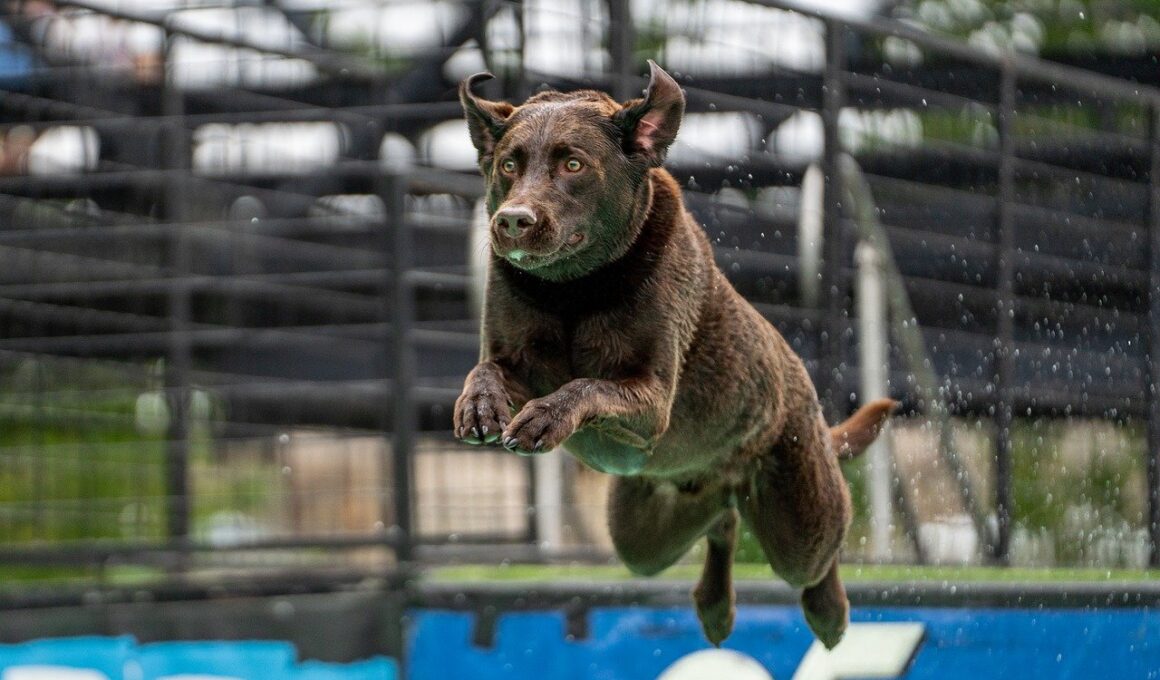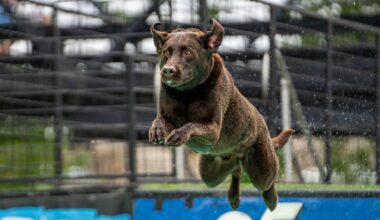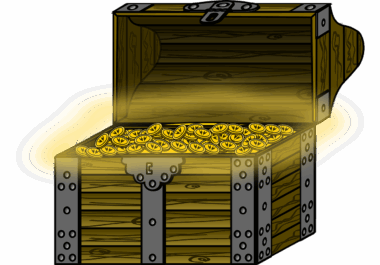Nutrition Tips for Active Dogs Engaged in Treasure Hunting
Nutrition plays a crucial role in enhancing the performance of active dogs, especially those engaged in the thrilling sport of treasure hunting. These dogs require a balanced diet that not only meets their energy needs but also supports their overall health. Owners should prioritize high-quality protein sources for muscle development and recovery. Chicken, fish, and lamb are excellent options for providing the necessary amino acids. Ensuring adequate hydration is equally important, so offering fresh water is essential during training sessions and hunts. Incorporating omega-3 fatty acids through fish oil or flaxseed can promote a healthy coat while supporting joint function. Alongside proteins and fats, carbohydrates are vital as they provide energy for long-lasting activities. Vegetables like sweet potatoes and grains like brown rice can serve as excellent sources of carbohydrates. It’s essential to adjust feeding amounts based on activity intensity to prevent obesity or energy deficits. Consulting with a veterinarian about specific nutritional needs tailored to your dog’s activity level is always recommended, ensuring optimal health during adventures. A dog engaged in treasure hunting needs a well-rounded diet to perform at its best.
Another vital aspect of feeding active dogs is incorporating the right vitamins and minerals into their diet. These nutrients are essential for maintaining overall health and can improve performance capabilities. A balanced diet should include a variety of fruits and vegetables, providing antioxidants, vitamins A, C, and E. Blueberries, carrots, and spinach are excellent choices that are packed with nutrients. Additionally, incorporating supplements may be necessary depending on the individual dog’s needs. For example, active dogs may benefit from vitamin B complex for energy metabolism or glucosamine for joint support. It’s also important to monitor the calcium and phosphorus balance to ensure proper bone health. Conditioning and physical exertion in treasure hunting can lead to fatigue; therefore, proper nutrition can combat this. Many owners opt for specialized dog foods designed for active breeds, which typically contain higher protein and fat content, along with necessary vitamins and minerals. This tailored approach to nutrition fosters endurance and enhances recovery time after long activities. When selecting dog food, owners should follow guidelines based on their dog’s weight and age to maximize benefits for their four-legged treasure hunters.
Understanding Serving Sizes and Timing
Feeding your dog the right amount at the right time can significantly impact their performance during treasure hunting. The serving size should correspond to the dog’s size, weight, energy output, and age. Utilizing the feeding guidelines provided on commercial dog food bags can serve as a baseline, but adjustments may be necessary based on individual needs. For active treasure hunters, offering meals several hours before engaging in rigorous activities can prevent discomfort and provide sustain energy. It’s generally recommended to feed approximately 30-60 minutes prior to training or treasure-hunting sessions. Furthermore, opting for smaller, more frequent meals can help maintain consistent energy levels throughout the day. This approach can also benefit dogs that tend to experience digestive issues during high-energy exertion. Post-activity nutrition is equally critical, as dogs require nutrients to recuperate. A meal with a balanced mix of carbohydrates and proteins after a hunt will aid in the recovery process and replenish lost energy. By keeping track of their dietary intake and observing your dog’s energy levels, you can fine-tune their feeding regimen to best support their treasure-hunting endeavors.
Special treats for training can also motivate and reward dogs engaged in treasure hunting, provided these treats are nutritious and fit within their dietary framework. Ideally, treats should complement their regular meals rather than serve as empty calories. Look for high-protein treats or those made from whole food ingredients. However, it is vital to limit the number of treats given each day to maintain overall caloric balance. Portion control is just as essential for treats as it is for regular meals. Treats can serve as training tools to reinforce positive behaviors while hunting, adding to the enjoyment of the sport. When picking treats, consider dogs with specific dietary restrictions or allergies. Always consult guidelines from your veterinarian to ensure that the treats are suitable for your dog’s diet. Choosing low-calorie options can also help in managing weight while allowing for positive reinforcement during training sessions. Engaging your dog with healthy rewards promotes a proactive relationship with their nutrition and training, enhancing their enthusiasm and performance in treasure hunting activities.
Monitoring Weight and Adjusting Nutrition
Monitoring your dog’s weight becomes increasingly crucial when they actively participate in sports. Regular weigh-ins allow owners to determine the effectiveness of their feeding regimen. Being attentive to any variations can help prevent obesity, which can limit a dog’s agility and stamina when treasure hunting. Fitting into a healthy weight range is vital not only for performance but also for overall health. If your dog is losing or gaining weight unexpectedly, it may be necessary to revisit their daily caloric intake along with their exercise routine and activity levels. A veterinarian can help assess whether this is symptomatic of larger health concerns or merely a result of dietary ineffectiveness. Adjusting portion sizes, modifying meal frequency, or switching to high-quality sport-focused dog food can all contribute to better weight management. Additionally, observing and recording your dog’s energy levels, stamina, and recovery times allows for more effective dietary adjustments. A vigilant approach to weight monitoring fosters awareness about your dog’s health and performance, ensuring they are always fit for hunting adventures.
In conclusion, providing nutrition tailored to the specific needs of active dogs engaged in treasure hunting is key to their success and health. Following the basic principles of providing high-quality protein, balanced carbohydrates, and essential vitamins can enhance their physical abilities. Regular consultations with a veterinarian, customized feeding schedules, and attention to weight management can ensure a well-rounded dietary approach. Additionally, considering dog-specific supplements may be warranted for extra support, especially in areas of joint health or energy metabolism. Maintaining proper hydration while in action is equally important and often overlooked by many dog owners. Incorporating nutritious treats wisely can offer motivation and reinforce training, further benefiting the dog’s performance. As each dog is unique, owners should remain attentive and willing to adapt their dog’s diet to fit their hunting style and energy requirements. This personalized approach ultimately translates to a more fulfilling treasure hunting experience, characterized by energy, enthusiasm, and well-being. Tailoring nutrition to the activities at hand not only improves athletic performance but also strengthens the bond between dogs and their owners.
The Joy of Treasure Hunting Together
The sport of treasure hunting offers an exhilarating experience for dogs and their owners alike. Engaging in this activity fosters teamwork, enhances training, and promotes physical exercise for both dog and owner. Through actively participating in treasure hunting, owners not only invest in their dog’s health but also create lasting memories during their adventures together. These bonding moments create contentment and enjoyment, an essential aspect of owning a dog. Proper nutrition becomes the foundation that supports these joyful activities, allowing dogs to excel in their performances. With a well-balanced diet, dogs can confidently navigate challenges, explore different terrains, and uncover hidden treasures. This sport encourages dogs to use their instincts and adds a sense of purpose to their daily routines. Both mental and physical challenges derived from treasure hunting contribute positively to a dog’s overall well-being. Owners can revel in their dog’s achievements, knowing that they are nurtured with the best nutrition tailored to their specific needs. The delightful journey of treasure hunting will promote a vibrant and healthy lifestyle for both dog and owner, enhancing their lives together.
In summary, the importance of nutrition for active dogs engaged in treasure hunting cannot be overstated. A well-balanced diet tailored to the demands of the sport will support your dog’s physical requirements and overall health. Maintaining clear communication with professionals like veterinarians can assist in fine-tuning diet plans along with performance expectations. As treasure hunting fosters a unique bond between dogs and their owners, focusing on proper nutrition enhances the fun and excitement associated with these adventures. Owners should approach feeding regimens carefully, mindful of energy demands, balancing proteins, healthy fats, and carbohydrates. Keeping a keen eye on any changes in weight will help ensure that dogs remain healthy and fit for engagement in sports. Nutrition directly influences energy, skill, and recovery, all of which are essential for optimum performance. Creating a feeding strategy that reflects individual needs, along with treats as tools for motivation, can help make treasure hunting a rewarding experience. With thoughtful considerations, active dogs can thrive in their pursuits, making treasure hunting a fulfilling sport that strengthens the lifelong bond between dog and owner.





